Breaking Bad Series Review (Spoiler-free!)
It was a marvelous end to a marvelous season, but I can't help feeling that something small went missing in Bad's careful, exacting pursuit of viewer satisfaction. It was precisely Bad's reliably dissatisfying elements that precipitated our greatest, most challenging conversations. Again and again, the series fooled us into celebrating with Walt: every time he caught a lucky break or outwitted another enemy, he'd pay the price in collateral damage and further complications. It was this cycle—euphoric celebration as Walt's plans seemed to succeed, then sickening dread as new complications arose—that gave the series a drug-like addiction. We wanted more even as it made us feel terrible. The final episode, in contrast, bordered on utopian: perfect, idyllic, and as a consequence, ever so slightly off-putting.
You might say that Lost ended in just the opposite way: it was muddled, dissatisfying, inconclusive, but strangely profound. Lost answered few of its most pressing questions, but in so doing, may have shown that we were asking the wrong questions all along. While I have an intense admiration for Bad, I don't expect I'll spend near the same amount of time puzzling over its final stanza.
Still, to focus so exclusively on Bad's atomically precise coda would be unfair to the show as a whole. To me, the series remains the most consistently stellar TV programming I've ever seen, mixing gorgeous camerawork, near-flawless acting, and impossibly efficient storytelling. Even my favorite shows tend to have clips here or subplots there that end up feeling unnecessary. But with Bad? I wouldn't cut two minutes from its 50+ hours; like good chemistry, every milliliter mattered. In its own calculating way, science can be as beautiful as art.
Counting Down My Favorite Breaking Bad Episodes (Spoilers)
"Grilled" - Season 2, Episode 2
Tuco threatens to ship Walt and Jesse off to Mexico. Walt tries to poison Tuco, but Hector Salamanca (mute, wheelchair-ridden) warns Tuco by repeatedly ringing a bell. Dialogue-less tension at its best.
"Crawl Space" - Season 4, Episode 11
Walt ends the episode under his house (in a crawl space), laughing maniacally. It's one of the series' most brutal, raw, and unsettling moments. Bryan Cranston nails it.
"Granite State" - Season 5, Episode 15
The penultimate episode, we get 75 minutes of a pathetic Walt watching his life waste away in a solitary cabin. It's a dull tragedy, and one that might have properly ended the series. "Granite State" provides a welcome—almost haunting—pause between the violent episodes before and after.
#10 "Felina" - Season 5, Episode 16
Why it's great: Though things work out a little too well for Walt, the episode is as clever, creative, and fun as a Bond film. Vince Gilligan (show creator and director of this episode) trades in complexity for a bit of neat resolution, but by this point, maybe we all deserve it. The creepy Schwartz house break-in and final Skyler conversation are both series stand-outs.
#9 "...And the Bag's in the River" - Season 1, Episode 3
Why it's great: After a series of brash moves and quick judgment calls, Walt must stew with a single, horrible decision. From his scientific pro/con list ("Con: he'll kill your entire family if you let him go") to his tortured epiphany about what must be done, Walt somehow wins us over while simultaneously repulsing us. It's a microcosm of Walt's psychological journey throughout the series.
#8 "Fly" - Season 3, Episode 10
Why it's great: A textbook "bottle" episode (low-budget, undercast, money-saving), "Fly" begins as a bit of a nuisance, before transforming into something strangely significant and character-focused. Director Rian Johnson puts Walt's demand for perfection and control on symbolic display, and creates more tension in a single room with two characters than most shows do with three crime scenes and a serial killer: storytelling economy at its best.
#7 "One Minute" - Season 3, Episode 7
Why it's great: Directed by the action-minded Michelle MacLaren, "One Minute's" final scene might just be the most harrowing sequence of the entire series. Unlike Walt and Jesse—whom by now viewers have come to expect will live to the final season—Hank is fair game. I still couldn't believe he was still alive, fully ten seconds into the closing credits. While the mid-episode Jesse-Hank vendetta plays well, it's the last five minutes that earn "One Minute" its spot among the greatest entries in the series.
#6 "Full Measure" - Season 3, Episode 13
Why it's great: Like much of Breaking Bad, Walt's genius, improvised plan carries with it a sickening undercurrent. Among all the drug empire's characters, Gale is by far the most gracious, giving, and harmless, a good-natured geek who once said that chemistry was still "magic" to him. Worse, his killer is Jesse, who until this point, could arguably have been excused for his prior dealings, an unlucky kid in a bad spot. If Walt crossed a point of no return in season 1, Jesse finally crosses the same point here.
#5 "Gliding Over All" - Season 5, Episode 8
Why it's great: With the possible exception of "Felina," "Gliding Over All" covers more story, includes more plot development, and spans a greater portion of time than any other Breaking Bad episode. Most remarkable of all, it doesn't seem rushed, making for the perfect (mid-)season finale. Bonus points for the "Crystal Blue Persuasion" cooking/empire-building montage…in my mind, the best montage of the series.
#4 "Salud" - Season 4, Episode 10
Why it's great: "Salud" is a rare episode. The primary setting is Mexico, and Walt plays more of a bit role, the spotlight reserved for Jesse and Gus. It's a delightful change of pace for longtime viewers, as we see Jesse succeed under pressure and Gus pull one of the most clever tricks of the series. The greatest moment of all: Gus's precise, orderly bathroom trip, in which he carefully removes his jacket, folds it, places a towel under his knees, and calmly chokes himself to remove the poison tequila. Horrifying, awesome, and vintage Gus.
#3 "Dead Freight" - Season 5, Episode 5
Why it's great: "Dead Freight" is easily Breaking Bad's most fun episode, with a heist sequence that would make Ocean's 11 and The Italian Job proud. The excitement alone would have earned "Dead Freight" a spot in the top ten, but the chilling final shot sends the merriment into a profound tailspin, forcing viewers to reevaluate the very thing they were just cheering. Breaking Bad plays this punch-in-the-stomach trick several times, but nowhere more effectively than here.
#2 "Face Off" - Season 4, Episode 13
Why it's great: Outside of "Felina," "Face Off" catalogues Walt's most successful scheme, executed to perfection. What's more, we get a nice tie-off to the bad blood feud between Gus and the Mexican Cartel. Even if Gus's tequila scheme worked, it's old-and-senile Hector Salamanca who gets to play the last sinister move. But what bumps "Face Off" up to #2 is the iconic, terrifying, unforgettable shot of Gus blown half to bits, still every bit as rigid and exact as he's always been. Some found the sequence unrealistic, but I ate it up. It's the most memorable ten seconds of the entire series.
#1 "Ozymandias" - Season 5, Episode 14
Why it's great: Named after the famous poem by Percy Bysshe Shelley, "Ozymandias" depicts the crumbling of Walt's empire, step by painful step. Even after an opening gun fight, Hank execution, and Jesse kidnapping, it's the Walt-Skyler knife fight that scars the most; from that moment forward, Walt loses all chance to reconcile with the very people for whom he'd always claimed he'd built his empire. While "Felina" allowed viewers to celebrate Walt's genius one last time, "Ozymandias" is arguably the spiritual finale, an indictment of Walt's choices and a proper Shakespearean end to the tragedy of Breaking Bad.

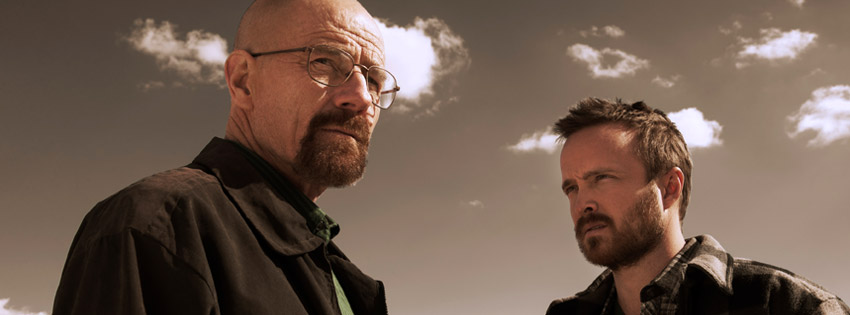
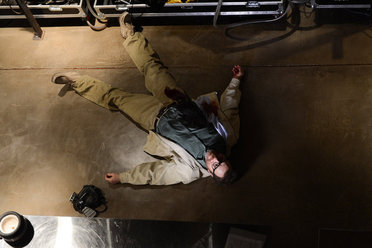
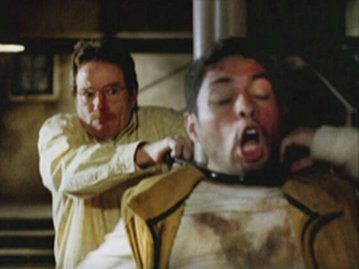
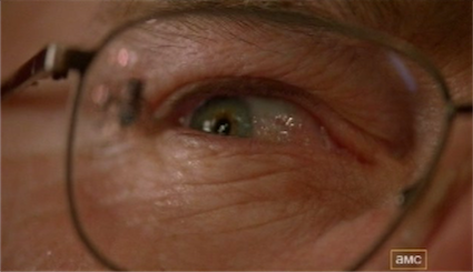
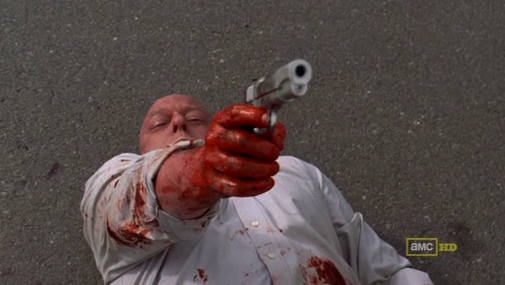
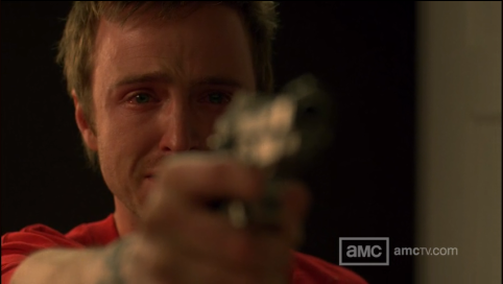
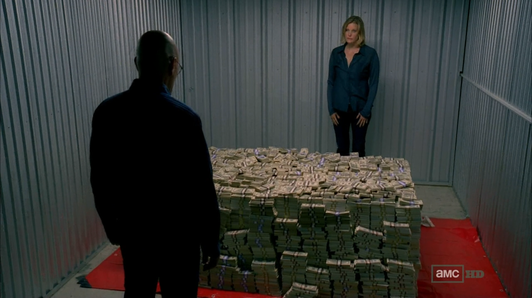
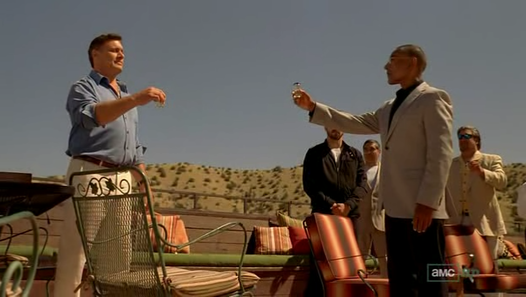
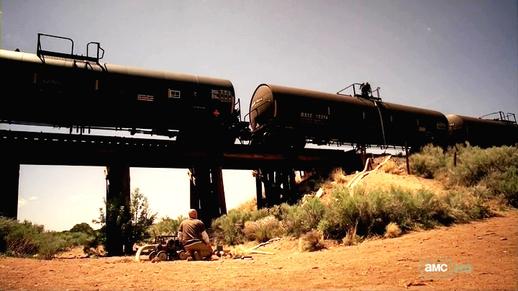
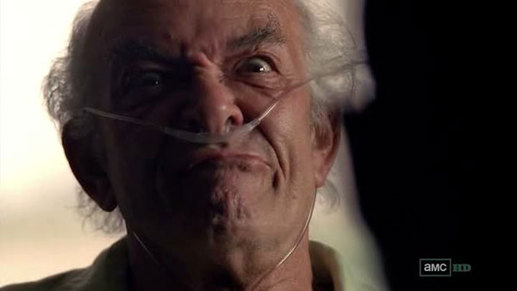
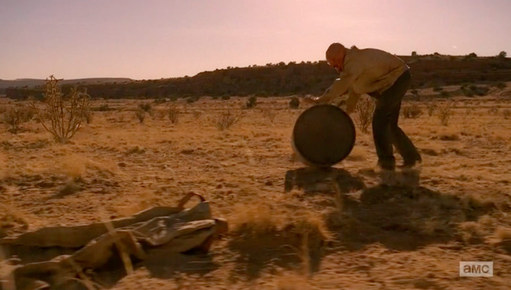
 RSS Feed
RSS Feed
